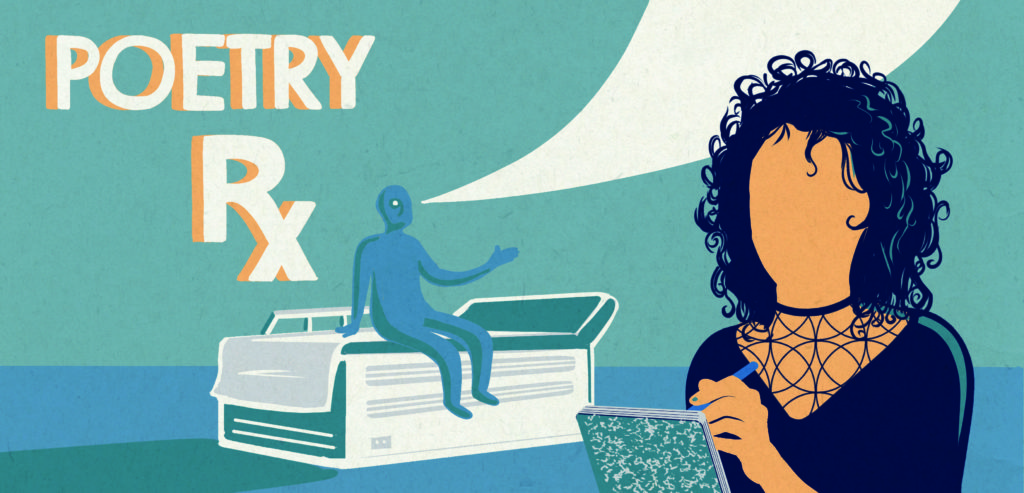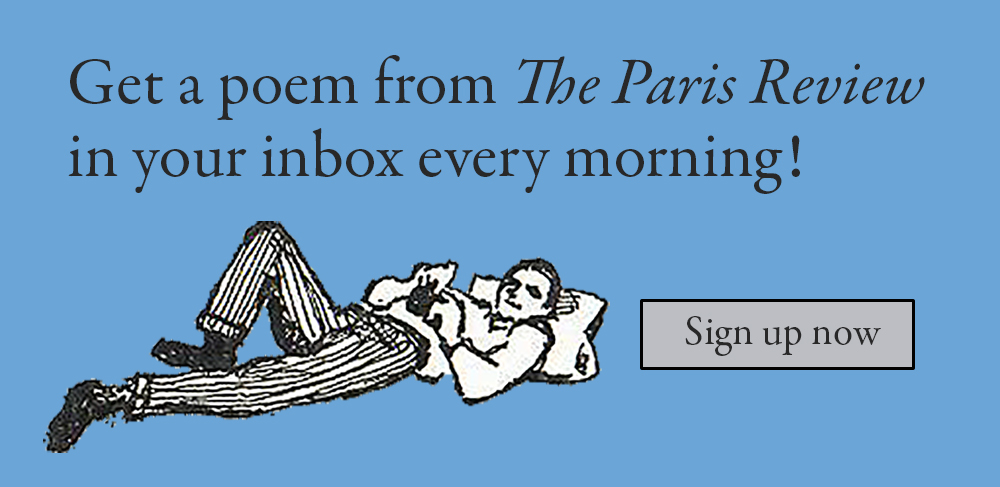In our column Poetry Rx, readers write in with a specific emotion, and our resident poets—Sarah Kay, Kaveh Akbar, and Claire Schwartz—take turns prescribing the perfect poems to match. This week, Claire Schwartz is on the line.
Dear Poets,
My family and I are what the newspaper headlines would deem immigrants. Living in a city where people of my kind are under constant scrutiny and threat has caused me to lose hope. I used to find solace in the community of poetry nights until I found myself subject to the same questioning stares there because of my headscarf. There are small acts of hatred that take place that don’t make their way into newspapers. My parents drop me off at university and their breath is suspended in the air until I text them, ‘reached alright.’ And again, they hold their breath till I walk through the front door at night.
I no longer think about my big dreams of writing or research. I pray for safety, for me and for everyone in need of it right now. Do you have a poem for this? For this feeling of being like a lost spaceship, floating with no promise of a return?
Sincerely,
Lost in a Big Crowd and Scared
Dear Lost in a Big Crowd and Scared,
I wish I had words to eradicate the conditions that make you afraid. I wish I had a poem that would eliminate white supremacy, make xenophobia a relic of another world. Brilliant co-Poetry Rx-er Sarah Kay says: “No, I don’t think poems will save us. And yet, and yet.” For you, a poem that lives luminously in the “and yet,” Fatimah Asghar’s “If They Should Come for Us”:
my people my people I can’t be lost
when I see you my compass
is brown & gold & blood
my compass a muslim teenager
snapback & high-tops gracing
the subway platform
mashallah I claim them all
my country is made
in my people’s image
if they come for you they
come for me too…
The urgency of this poem may be inflected by violence, but it is love that shapes Asghar’s looking. “If They Should Come for Us” reminds me that fear is love laced with the danger of loss. Look at the universe here: “the toddler dangling from stroller / hair a fountain of dandelion seed,” “the muslim man who abandons / his car at the traffic light drops / to his need at the call of the azan,” “the lone khala at the part / pairing her kurta with crocs.” Asghar assembles by noticing her people’s beauty. What an act of love. I hear that love, too, in how you trace your parents’ breath with your language, how you reach for each other.
I hate that the world has given you reason to be afraid. I hope the compass of Asghar’s poem points you toward the widening way that love makes amidst all else that is.
my people I follow you like constellations
we hear the glass smashing the street
& the nights opening their dark
our names this country’s wood
for the fire my people my people
the long years we’ve survived the long
years yet to come I see you map
my sky the light your lantern long
ahead & I follow I follow
—CS
*
Dear Poets,
I am a new mother from Australia. My husband and I welcomed our little one into the world 3 months ago, and in that time my husband has been incredible. He has stepped up in all facets of parenting, seemingly inventing new levels and ways of being an amazing father. I can barely explain how amazing he is – beyond nappies and late nights and settling, he has such openness to getting to know her, her temperament, her preferences and her patterns. I can see his relationship blossoming on a level that is somehow unspoken or difficult to describe. And he has cared for me too, when I couldn’t care for myself, lighting the way for me to go forward and evolve as a mother, even when I could not see the next step. I have tried to express to him how amazing he is but I can’t find the words. I also keep telling him – thank you, thank you – but the depth of my gratitude cannot be expressed. How can I express something to him that is so beautiful it seems to me beyond words?
Love,
Bearing witness to an amazing father
Dear Bearing Witness to an Amazing Father,
Wow—what a beautiful letter to receive! I love these ways your husband gives form to his love. I love the care of your attention and that you’re seeking a form to meet his. I confess, when I read this for the first time, I was anticipating a turn. Narrative tells me that there will be an arc—what begins one place will end somewhere else. But poems! Poems teach you what you already know: to meet that wild feeling on its own terms. When I finished your letter, I thought immediately of a poem charged with exuberance the whole way through, Hera Lindsay Bird’s “I Am So in Love with You I Want to Lie Down in the Middle of a Public Intersection and Cry”:
is not how you are supposed to start love poems
but I’m too far gone to work up to it gentlyyour naked back in the mirror
has cured at least 3-4 major diseases
In Bird’s poem, the force of love immediately breaks the rules. There is no real-world corollary that will satisfy the immensity of the speaker’s feeling, so she reaches for something as important to the world as the love is to the speaker. Even that pales in comparison. 3 major diseases? 4? Who really cares about major diseases in the face of all that love?
I do not know how to write a love poem
because love is indescribable
it’s this feeling you get
when your mind gets hot
and everything else gets insignificant………………..with diamonds on it
The world doesn’t offer any ready-made container for this wild love. (And is there any other kind?) That’s why you can’t find the words. In casting about for what is impossibly beautiful and then going even one step further than that, the speaker forges new forms of possibility. And, after all, isn’t that what love does?
—CS
*
Dear Poets,
Two years ago, I met someone and fell for him within 7 minutes of meeting him. Somehow, impossibly, the connection was mutual – but he had a girlfriend, so nothing ever happened. Two months ago, he broke things off with her. We fell into a big, expansive, whirlwind of connection, unlike anything I’ve experienced. Magical things happened: shooting stars, a grunion run, pink sunsets, his hand in mine. Two weeks ago, he told me he still loved his former partner and needed to try to be with her. I feel blindsided and heartbroken. What if he was my only chance at feeling this great, big love?
Fondly,
The One Who Wasn’t Chosen
Dear The One Who Wasn’t Chosen,
First, a word about what you call yourself. The great poet June Jordan wrote, “The syntax of a sentence equals the structure of your consciousness.” She said that the passive voice can protect the one who causes harm, can make the course of things feel inevitable. It’s not true that you are not chosen. It is true: he did not choose you. That is a different, difficult thing. Grieve that relationship. But don’t give him the power to define you. What happens if you make yourself the subject of your own experience? Let me start this letter over.
Dear One Who Has the Capacity for Great, Big Love,
I want to give you Alice Walker’s poem, “Desire,” which reminds me of the gorgeous enthusiasm which with you dove into your relationship:
My desire
is always the same; wherever Life
deposits me:
I want to stick my tow
& soon my whole body
into the water.
You dove into the chance to love because you, too, were moved by your desire. Desire is a dazzling and unstable thing. Sometimes it shoots through like a lightning bolt and leaves us withered in its wake. Sometimes it is the current of electricity that makes the house more livable. Walker writes: “I want to grow / something.” How to coax that desire into something that blooms?
It seems impossible that desire
can transform into devotion;
but this has happened.
And that is how I’ve survived:
how the hole
I carefully tended
in the garden of my heart
grew a heart
to fill it.
Focus now on the practice of devotion to your own life. The desire will find new forms.
—CS
Want more? Read earlier installments of Poetry Rx. Need your own poem? Write to us!
Claire Schwartz is the author of bound (Button Poetry, 2018). Her poetry has appeared in Apogee, Bennington Review, The Massachusetts Review, and Prairie Schooner, and her essays, reviews, and interviews have appeared in The Iowa Review, Los Angeles Review of Books, Virginia Quarterly Review, and elsewhere.
from The Paris Review https://ift.tt/2Q4U0VU


Comments
Post a Comment